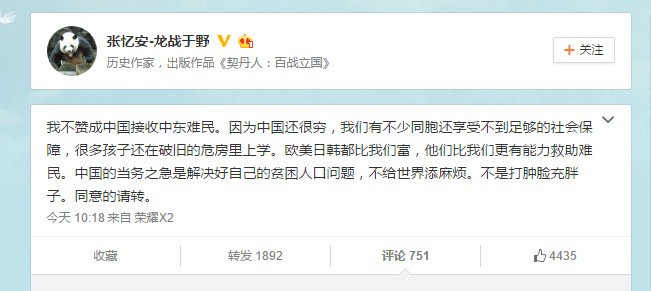A debate is brewing in the Chinese social media about whether or not China should take in Middle Eastern refugees fleeing unrest in their homelands, after the tragic death of a Syrian boy helped open doors for refugees to European countries.
Netizens on multiple mainland online discussion forums have so far been overwhelmingly against the idea, saying China is not responsible for turbulence in the Middle East, many Chinese people are still living in poverty and that the refugees won’t want to come to China anyway.
However, supporters of the idea said China needs to build up a “responsible world power” image and actively take part in solving the Syrian refugee crisis.
Last week, an image of a three-year-old Syrian refugee lying lifeless by the Mediterranean Sea made headlines around the world, touching many and prompting calls for more to be done to help tens of thousands escaping the war in Syria and unrest in other Middle East countries. The boy, Alan Kurdi, and his family were trying to reach Greece when their overloaded boat capsized on September 2.

Following the tragedy, some European Union countries announced plans to offer new settlements for refugees, including Germany and the UK.
Après le scandale Aylan – © Chappatte dans NZZ am Sonntag, Zurich pic.twitter.com/aH6Ale7Afr
— Dessins de Chappatte (@chappatte) September 7, 2015
China has not made any comments regarding the Syrian refugee crisis since the death of Kurdi.
A user called “opec” on Canadian Chinese forum comefromchina.com said on Saturday the Chinese government made a vow to contribute to world peace and prosperity during last week’s World War Two victory day parade and now it’s time to deliver on that promise.
Netizen “frankkee” on the popular Tianya Forum echoed that point, saying refugees will do more good than harm. He suggested Beijing nurture pro-China voices among the refugees and have them speak for Chinese interests when they go back to their home countries.

Comments on both websites were mostly negative. Some said Western countries, especially the United States were responsible for escalations in the Syrian civil war. “When the US proposed sanctions against Syria in the United Nations, China and Russia voted against it, meaning they foresaw this would lead to severe consequences,” a user on comefromchina.com said. “The US helped caused the trouble in Syria, leading to the rise of ISIS, therefore US should take the refugees,” another said.
Meanwhile, many pointed out that the refugees would prefer welfare states in the West over China. “Don’t overworry yourself, even if we say yes, they wouldn’t want to come,” one user on Tianya said.
Many others on the Twitter-like Weibo made the same point. “The refugees want to go to Germany… who wants to come to China?” One said. “China cannot provide refuge…because we the Chinese look more like refugees,” another said.

The comments were made under a post by Beijing-based writer Zhang Yi’an. Zhang said he is against taking in refugees because China has not solved its own poverty issue. “Many compatriots still lack social insurance, many children are still going to school in shabby classrooms,” Zhang said.
His post, made Monday morning, received hundreds of comments and shares in just two hours. Similar conversations also appeared on Zhihu.com and other forums over the past three days.
The semi-official Global Times newspaper ran a commentary saying that the West was to blame for sponsoring “color revolutions” and must now face the consequences. “If huge social unrest takes place, the outside world is unlikely to allow waves of Chinese refugees in”, the paper added.
State news agency Xinhua reported on Monday that the US has no plans to take in Syrian refugees.
